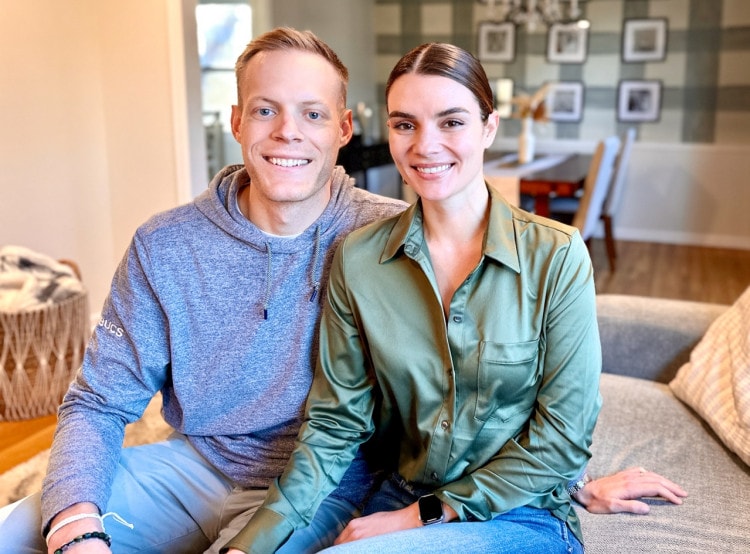‘So Much Life Ahead of Him’: Kansas City Couple Hopes for Living Kidney Donor Joey and Audrey Sughroue are on a Waitlist That Could be Up to 2 Years
Published February 14th, 2023 at 6:00 AM
Above image credit: Joey and Audrey Sughroue got married July 2022. Their hope this year is to find a living donor for Joey, whose kidneys are at 10% function. (Contributed)It was 2019 and Joey Sughroue had just moved to Kansas City from Nebraska.
As he settled in a new city, he’d regularly go to parties hosted by a childhood friend. One night, he met his friend’s roommate, Audrey. She wasn’t often at those parties, but they clicked.
The catalyst to their romance was their first text exchange at 3 a.m.
“Tacos?” Audrey wrote.
The rest is history.
They started dating several months before the pandemic lockdowns, and as a result spent every day together.
This July, Audrey and Joey will celebrate their first wedding anniversary. But their focus is on finding a kidney donor. They say the quest to find a transplant became part of their relationship from day one.
“Right after I had my biopsy, we met,” Joey said.
“It’s not really something you start to bring up at the very beginning of a relationship like, ‘Hey, I have severe kidney disease,’” Audrey recounted.
But they have weathered four years together, finding moments to travel and experience married life as best as possible. Although he’s 29-years-old, Joey’s kidney function hovers at around 10%.

Doctors say he needs a transplant in the next five to 10 years. Audrey wanted to donate hers, but their blood types are different, so Joey is on a waitlist.
They have also been added to the University of Kansas Medical Center’s paired kidney donation program. This program would let her donate a kidney to a stranger in need. In exchange, Joey would receive a kidney that is a match.
Seated side-by-side with their 6-month-old puppy, Joey looks at Audrey.
“She’s been a godsend for me,” he said. “Helps me stay on track and keeps me honest. has been a great support.”
They are determined to find a donor and get the word out.
Audrey has immersed herself in research to understand her husband’s condition and what people can do for folks like him. She finds learning about her husband’s disease has quelled her fear of surgery.
Support groups and Facebook forums equipped her with the language and knowledge needed to ask the right questions and given answers to the many questions she has.
“He has so much life ahead of him. But without getting a kidney … he won’t live five to 10 more years,” Audrey said.
Joey remembers health issues cropping up as early as middle school. In high school through college, he took low doses of blood pressure medication. As he grew older, symptoms of the disease progressed, particularly when he moved to Kansas City.
He sought answers, and found support, at KU Med Center.
After rounds of evaluations and a biopsy, he received a diagnosis — Alport Syndrome, a genetic condition that damages blood vessels in the kidneys, which can cause progressive kidney failure.
Joey’s mom has the same disease, but symptoms manifest differently in men. He mostly experiences fogginess and fatigue. Some days, he feels winded after minimal activity.
That’s par for the course with kidney disease, said Dr. Jeffrey Klein, a nephrologist at the University of Kansas Health System. Klein is also medical director for the system’s living donation center.
“A lot of (patients’) nutritional health and overall functional health tends to deteriorate around kidney failure. Kidney failure is really a wasting disease,” he explained.
For young people like Joey, the goal is to find a transplant and avoid dialysis. Klein explained dialysis can disrupt daily life. For example, one typical session lasts four hours and patients tend to go three days a week.

“It’s kind of like having a part-time job to maintain your life,” Klein said.
That treatment helps poor-functioning kidneys work properly, but the downside is the time commitment and how it makes folks feel afterward. If kidney function is at 5%, Klein explained, then physicians often recommend dialysis.
Kidneys filter out toxins and remove them through the urine. An analogy — a sink filter.
“You want to hold on to the good stuff, and the bad stuff goes through,” said Dr. Nicholas Herrera, a nephrologist at KU Med.
When kidneys aren’t working properly, like Joey’s, interventions are needed. However, kidney disease is common, which leads to long waitlists. Klein says there’s also a shortage of kidneys available off the waitlist, which include kidneys made available when someone dies.
“You’ve got 100,000 people waiting for organs, 20,000 organs that are provided per year. How do you make up the shortfall?” Klein said, then answered his own question.
“We really depend on the good nature and altruism, individuals that are interested in donating during their lives.”
On average, it takes years to find a match for the person’s blood type, age or condition.
For people like Joey with O-type blood, it will take an average of 600 days — or one and a half years, Herrera said while flipping through a stack of papers on his desk. The ideal outcome is to find Joey a living donor.
“It’s a difficult process as a whole, because there’s a lot that goes into it,” Herrera said. “And it’s not just a medical aspect, there’s also a psychological and psychosocial standpoint.”
The differences between a deceased donor and living donor come down to how long the kidney transplant will last.
The typical longevity of a deceased person’s donor organ is eight to 10 years, while a living donor organ can last upwards of 30 years. Herrera, who is nephrologist in pediatric and adult medicine, has overseen transplants for younger patients. Younger patients often need to get a second or third transplant in their lifetimes.
“We want every single one to (have the) best kidney that we can so that we can minimize things like major surgeries, immunosuppression, induction therapies, over time,” he explained.
For now, the Sughroues’ life plans are on hold.
They want to expand their young family but want to be at their best health-wise. A transplant is the best option.
They both have a message for people pondering whether to become a donor.
“(Learn) how it can save a life, what your body is capable of doing to give someone to give them their life back — a chance to live the rest of your life as he should be able to,” Audrey said.
Joey nodded and added, “You have the opportunity to be a lifesaver, which I mean, not a lot of opportunities to do that.”
Want to become a donor? Here’s what you need to know:
+ Be a healthy adult 18 years or older
+ You will need to first be evaluated by a qualified medical professionalWhere can I sign up for an evaluation or donate?
+ Midwest Transplant Network, Click Here
+ HCA Midwest, Living Donor Kidney Transplant Program, Click Here
+ University of Kansas Health System, Click Here
+ Donate Life Missouri, Click Here
ℹ️ Learn about the National Living Donor Assistance Program here, which curbs the costs associated with living donation expenses such as travel, lost wages and more.
Vicky Diaz-Camacho covers community affairs for Kansas City PBS.


